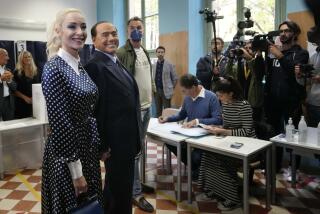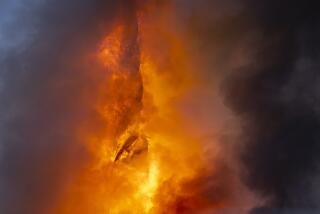Iraqi Cleric Takes Center Stage
Grand Ayatollah Ali Sistani, the black-turbaned cleric who was the architect of what appears to be a landslide victory by Shiite Muslims in last week’s landmark Iraqi elections, is now poised to shape the new government, including its choice of prime minister and the drafting of the country’s constitution.
Iraq’s senior most Shiite cleric, Sistani has made it his chief cause to propel his community, long oppressed under Saddam Hussein, to the leadership of one of the Middle East’s most prominent countries. And he is on his way to succeeding: The slate he helped pick, the United Iraqi Alliance, appears to have won more than triple the votes of the next-highest slate, that of interim Prime Minister Iyad Allawi, a secular Shiite.
“What he wants is influence over the constitution-writing process,” said Mowaffak Rubaie, a prominent Shiite politician. “He wants to be sure it’s done right.”
The electoral sweep gives Shiites allied with Sistani a measure of power that they have not had in Iraq in centuries. But for the U.S., their victory also raises the specter of an Islamic state with more ties and affinities to Iran than with any other country in the region.
The extent to which Iraq becomes an Islamic or a secular state will be largely in the hands of this Iranian-born cleric, who, like most of the ayatollahs who surround him, has not met with U.S. diplomats or their British counterparts since the invasion in 2003.
Shiites represent about 10% of the world’s 1.2 billion Muslims, but in Iraq, they are in the majority, believed to make up about 60% of the population. The only other countries in which they predominate are Iran and Bahrain.
Sistani’s Alliance slate has secured about 69% of the 3.2 million votes counted so far in the national assembly election, or about 38.5% of the total cast, according to a tabulation by the Los Angeles Times. Although that percentage will drop once the Kurdish provinces of the north are counted, the Alliance’s share will almost certainly continue to be well over 50%.
Although the 74-year-old Sistani insists that he wants nothing to do with politics, he has been arguably the most important figure on the Iraqi political scene almost from the day the Americans entered the country.
Early in the occupation, he championed direct elections -- a demand that the U.S.-led Coalition Provisional Authority accepted only reluctantly. He also insisted that the constitution could only be written by a body directly elected by Iraqis.
A year ago, hundreds of thousands of his followers took to the streets to support a faster timetable than one proposed by the U.S. and, even more impressively, Sistani was able to send them home, as if he were turning off a tap.
Once elections were set, he engineered the formation of a largely Shiite slate of candidates, many with a religious orientation. Heading the list is Abdelaziz Hakim, leader of the Supreme Council for the Islamic Revolution in Iraq and a cleric who spent nearly 20 years in exile in Iran during the Hussein regime.
Three of Sistani’s envoys, all clerics, are on the list, and the Dawa Party, a theocratic Shiite party with ties to Iran, has a strong presence on it.
But Sistani also included those without ties to religious groups, such as Ahmad Chalabi, who heads the Iraqi National Congress, and independents such as nuclear scientist Hussein Shahristani.
Sistani let the slate use his picture on its campaign materials and he issued a fatwa, or religious opinion, making voting a duty on a par with fasting in Ramadan.
But the next phase will have even greater consequences. Under the transitional administrative law that governs the political process, the national assembly that was just elected will name a committee to draft a permanent constitution. The panel can include members of the assembly and outsiders to write the document, which must be approved by the full assembly and put to a popular referendum to take effect.
Sistani’s associates say he has prepared for this moment for years. Although he has lived a cloistered life in the Shiite holy city of Najaf, immersed in religious study, he is said to be passionately interested in politics and can converse in depth about different systems of government.
From his office on a narrow street in Najaf’s Old City where the small brick houses are jammed together, Sistani has a far-reaching network of representatives that stretches from Pakistan to Lebanon to Britain.
He keeps in constant touch with them through e-mail as well as by telephone. His high-speed Internet connection is similar to the kind used by large corporations and governments, according to an Iraqi government official familiar with the system. His staff uses it to research any subject in which the cleric takes an interest.
His son Mohammed Ridha is one of his chief assistants and is deeply involved in politics. Mohammed Jawad, his other son, is a clerical scholar.
“Sayyid Sistani knows about the French Revolution, the American Revolution. He had read about the election in East Timor,” Shahristani, the nuclear scientist, said. “I remember when I went to see him, I joked and said how impressed I was at how much he had read.”
According to Shahristani, Sistani replied: “We read all your books. You don’t read all your books, but we have the time -- we are just sitting here” and gestured to the spare reception room where the cleric greets visitors, who sit as he does, on flat floor cushions.
A cleric friend said Sistani had readied himself to wrestle with constitutional principles. “He is knowledgeable about the American, French and German constitutions and the British unwritten constitution,” said Sheik Jalaludin Saghir, the chief cleric at the Bratha mosque in Baghdad, one of the city’s largest Shiite mosques.
But it is unclear exactly what kind of government Sistani wants. Because he does not give interviews to Western reporters, the only way to gauge his leanings is to talk to Shiite clerics and politicians who have met with him and to read his copious writings.
Sistani has explicitly distanced himself from Iran -- he refused to meet with a delegation from the Iranian Foreign Ministry who came to help resolve troubles with the anti-American Shiite cleric Muqtada Sadr. The implication is that he wants to make it clear both to his Iraqi followers and to the Iranians that he will not take orders from his Persian neighbors.
He also doesn’t support the Iranian theocracy that is based on the late Ayatollah Ruhollah Khomeini’s doctrine of velayat-e-faqih, or rule of religious jurists.
But Sistani, who was born in the Iranian city of Mashad, a pilgrimage center, does envision a powerful role for clerics in the new Iraq.
Secular members of the Alliance slate say Sistani does not plan to allow clerics to serve in government, but several associates of Sistani, including Saghir, say that there is no hard-and-fast rule.
In fact, although Sistani was reluctant to have clerics run for the transitional national assembly, he bent that rule because he wanted to be sure that people he trusted would be in a position to influence the writing of the constitution, Shahristani said.
The areas in the constitution that matter to Sistani concern the role of Islam in Iraq, Saghir said. “The main religion of Iraq is Islam, and laws should not run counter to Islamic teachings,” he said.
Sistani expects Islamic Sharia law to be enforced in certain areas, including domestic matters that would have considerable impact on women, possibly reducing their rights compared with what they would have under a secular system.
Also, for instance, the sale of alcohol probably would be banned, Saghir said. That would be a turnaround for Iraq, which was a secular state under Hussein, where Christians sold alcohol and many Muslims drank despite Koranic prohibitions.
“Sistani’s position is analogous to that of the Christian Coalition in American politics. He wants civil law and policy to be in conformance with Islamic law and principle as far as possible,” said Juan R. I. Cole, associate chair of the history department at the University of Michigan.
“He will use fatwas and persuasion to try to influence parliamentary and political debate on issues that are important to him,” Cole said.
The ascendancy of the Shiites in Iraq will change the sectarian balance of power in a region where Sunni Arabs dominate the political scene. For Shiites to come to power in Iraq, the heart of the Arab world, has tremendous symbolic significance and is certain to reverberate through Shiite communities in the region.
“Shiite ascendancy in Iraq is a huge development for the Arab world,” Cole said. “Shiites in Saudi Arabia have been persecuted. Shiites in Iraq were marginalized. Shiites in Lebanon were the poorest and least powerful group. Shiites in Bahrain, despite being a majority, were marginalized.
“The Shiite-dominated government in Iraq will be a champion of Arab Shiite rights. If the Shiites in Saudi Arabia are repressed, the prime minister of Iraq will fly from Baghdad to Riyadh to complain.”
Edward W. Gnehm Jr., a former U.S. ambassador to Jordan and Kuwait and now a professor of international relations at George Washington University, spoke to the fears of the Sunnis in the region.
“Other, mostly Sunni states will be more afraid that the outcome of the Iraqi elections will embolden the Shiite minorities in their own country, rather than what it portends for democracy in their countries,” he said.
Jordan’s King Abdullah II was among others who have warned that the elections might create a “crescent” of Shiite dominance.
“Personally, I don’t think we’ll see a Shiite arc that goes from Lebanon to Iraq and Iran, but that would be the nightmare of Sunni states,” Gnehm said.
More to Read
Start your day right
Sign up for Essential California for news, features and recommendations from the L.A. Times and beyond in your inbox six days a week.
You may occasionally receive promotional content from the Los Angeles Times.






